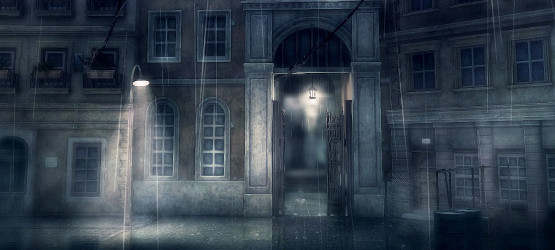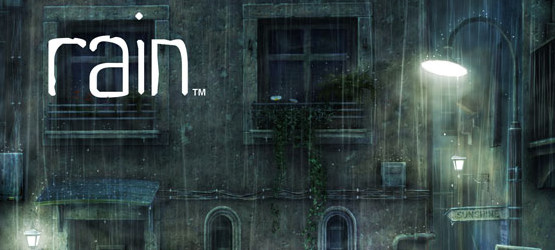Rain is a pretty narrative in video game form, a storybook tale for adults. Rain is meant to draw players in and envelop them within its mid-1900s Paris back alleys and sewers. For the most part, Rain succeeds at these endeavors.
The story features a boy who is looking out his window as it rains. He sees the outline of a girl traced in the rain, followed by the outline of large, inhuman assailant. He follows both through a door of light and loses his own body in the process. Now, he is only visible in the constant rain pouring over the town – stepping out of the rain will render him fully invisible. The girl, the inhuman assailant, and the creatures he encounters throughout the rest of the story have the same properties: Every one of them becomes invisible without the rain.
Rain’s sound effects and music are what really immerse the player in Rain’s world. The steady fall of rain and the background music evoking Paris of the time are wonderfully done. No dialogue is spoken in the game. Instead, text appears on screen in an unobtrusive and cinematic manner to showcase the thoughts and feelings of the protagonists. The game has elements of survival horror and often uses scare chords to punctuate the appearance of the monsters. Though often used, the scare chords are appropriate for the title. Throughout the entire narrative the sound of rain persists. The sound effects and audio bring the setting of the title to players in ways few games manage.
The game’s graphics are suitable for the title. The architecture of the buildings is well done, the rain is well done, and the interaction with water is well done. The only downside is the appearance of the characters in the story. They are supposed to be framed by the rain, but in actuality look closer to electrostatic phantoms. It quickly becomes a non-issue once the sound envelops players and the storybook nature is accepted. The game is not colorful, but color and light are used effectively. On their own, the graphics serve the game; but it is the combination with sounds and background music which complete the player’s immersion.
As stated above, Rain is foremost a narrative, and this readily affects gameplay. The game is incredibly linear and the puzzles are quite easy. Dying was only common because I kept running down different corridors to see if anything happened during the chase scenes. And there are a lot of chase scenes. Those expecting scares of the survival horror genre will be dismayed. While scare chords are used effectively, all of the efforts at immersion do not make the game scary. Outside of the chase scenes, the narrative is reflective and somewhat precious – factors which push aside the feelings of stress and desperation normally attempted in survival horror titles. The ultimate effect on the game is that it feels less like something to be played and more like something to be watched or read. This is great for proponents of narrative in video games. Not so much for those who want to play a game. Beating the game unlocks orbs for players to find, and finding some of these orbs can be a challenge. However, this game of hide-and-seek with the orbs is the most the game has to offer beyond moving the narrative forward.

Unlocking the orbs on the second playthrough may seem like an odd design choice. It should be noted that since narrative is the focus of the game, running around trying to find these orbs would take away from moving the story forward. That’s how important narrative is over gameplay – gameplay incentives beyond narrative are locked out until the game is beaten.
The narrative is good at first glance, though closer inspection will divide audiences. The posters and chalk scribbles seen on the alleyway walls and underpasses reveal what might be behind the events, but the game offers no answers. Quite frankly, little in the game makes sense should any deep thought be applied. Despite these shortcomings, Rain still manages to be a decent storybook tale with little to offer in the way of an Aesop. The orbs which are available once Rain is beaten do expand upon the story presented in Rain, yet still do not offer much in the way of answers.
The excellent work the sound team has accomplished with Rain really must be restated. At one point, I dozed off listening to the sound of rain and the game’s soundtrack; the fusion creating the right ambiance for a tired mind. Thankfully, I had managed to hit pause as I fell asleep. And the music which plays at the ends credits – available from the main menu at any time – often found a replay at different times during the day due to the feelings such music is capable of evoking. During one of the Developer Diaries, Composer Yugo Kanno commented that Rain was one of the more peaceful projects he worked on. That feeling of peace really shines through in the final product.
And this is where I stand when it comes to Rain. It’s a very peaceful game, and that alone should be given a whirl. The gameplay is linear and replay value is all but limited to a second run of collecting orbs. The story won’t stand up to much scrutiny, though if taken at face value there is a lot of charm. The game does manage to immerse players in Rain‘s world and the sound team in particular has done a fantastic job. The results of their work will likely draw an emotional response from Rain‘s intended audience. For people looking to play a game, this is not Rain’s foremost concern. For people looking to experience a narrative, Rain is for you.
-
Immersion is fantastic - Sound and music really stand out
-
Nice storybook tale with great presentation
-
Well-aimed at its intended audience
-
Very linear â narrative overshadows gameplay
-
Limited replay value




